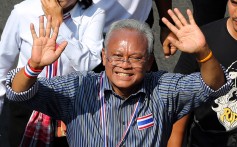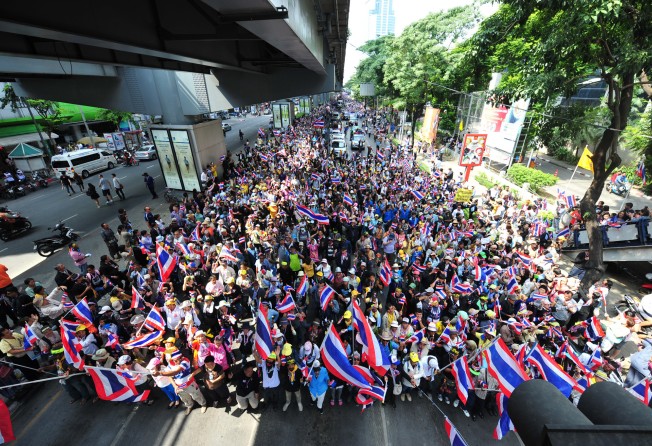
Thai opposition weighs poll boycott in crunch weekend
Anti-government protesters must resolve a dilemma over participation in snap elections called by the government of Prime Minister Yingluck Shinawatra

Thailand’s opposition is meeting on Saturday to mull a possible boycott of snap elections in a crunch weekend for the crisis-gripped kingdom as protesters prepare to ramp up rallies aimed at toppling the government.
The opposition Democrat Party, whose MPs resigned en masse to join the demonstrations, is set to hold talks on whether to participate in February 2 polls called by embattled Prime Minister Yingluck Shinawatra.
Bangkok has seen weeks of street marches, with protesters invading government buildings and gathering in their thousands in the latest eruption of political unrest in the turbulent nation.
The protests are calling for democracy to be suspended and want to rid the country of Yingluck and the influence of her brother Thaksin – an ousted billionaire ex-premier who is despised by a coalition of the southern Thai poor, Bangkok middle classes and elite.
Analysts say the elections pose a grave dilemma for the Democrats – Thailand’s oldest party, which has not won an elected majority in more than two decades.
If it chooses to boycott the poll, it risks being excluded from the political process, while a decision to join will dismay protesters who have vowed to disrupt the vote.
Some 200 party members will begin meeting on Saturday afternoon, said deputy leader Ongart Klampaiboon, adding that he was uncertain how long the deliberations could go on for.
“I think the meeting will take sometime but I don’t know how long. We will vote to reach our decision,” he told reporters.
He said the party appeared to be split “50-50” on whether to participate in the election.
The Democrats on Friday sent a letter to other parties requesting a postponement of the polls because of the ongoing protests, Ongart said.
But the suggestion was rejected by the ruling Puea Thai, which is widely expected to win the election.
Initial party registration for the vote begins on Monday and lasts until December 27.
A Democrat boycott in 2006 helped create the political uncertainty that heralded the military coup which ousted Thaksin.
But new election rules meant the party “would be doomed to the wilderness” if it boycotted and Puea Thai could pick up some of its constituencies, said Paul Chambers, director of research at the Institute of South East Asian Affairs at Chiang Mai University.

The opposition meeting comes a day ahead of a planned major rally by the protesters, who are led by firebrand former Democrat MP Suthep Thaugsuban.
Suthep, who has vowed to rid Thailand of the “Thaksin regime”, has dismissed the election, saying it will install another government allied to the divisive former premier.
He has appealed for army support, in a country which has seen 18 successful or attempted coups since 1932.
But the army has indicated it is unlikely to intervene directly this time.
Authorities this week froze bank accounts related to dozens of key protest figures, including Suthep, who is also facing an arrest warrant for insurrection linked to the ongoing political crisis.
Supporters were seen thrusting banknotes at Suthep as he marched through the capital in recent days to drum up support for Sunday’s rally.
Demonstrators want Sunday’s gathering to be bigger than earlier protests, which have drawn at least 150,000 supporters at their peak in some of the largest demonstrations for years in the politically-divided kingdom.
Thaksin, who lives abroad to avoid a jail term for abuse of power, is loathed by the Bangkok middle classes and elite, who accuse him of using his electoral majority to attempt to consolidate power.
But he is adored by the mainly rural voters in his north and northeastern heartlands, who have helped him and his allies win every election since 2001.